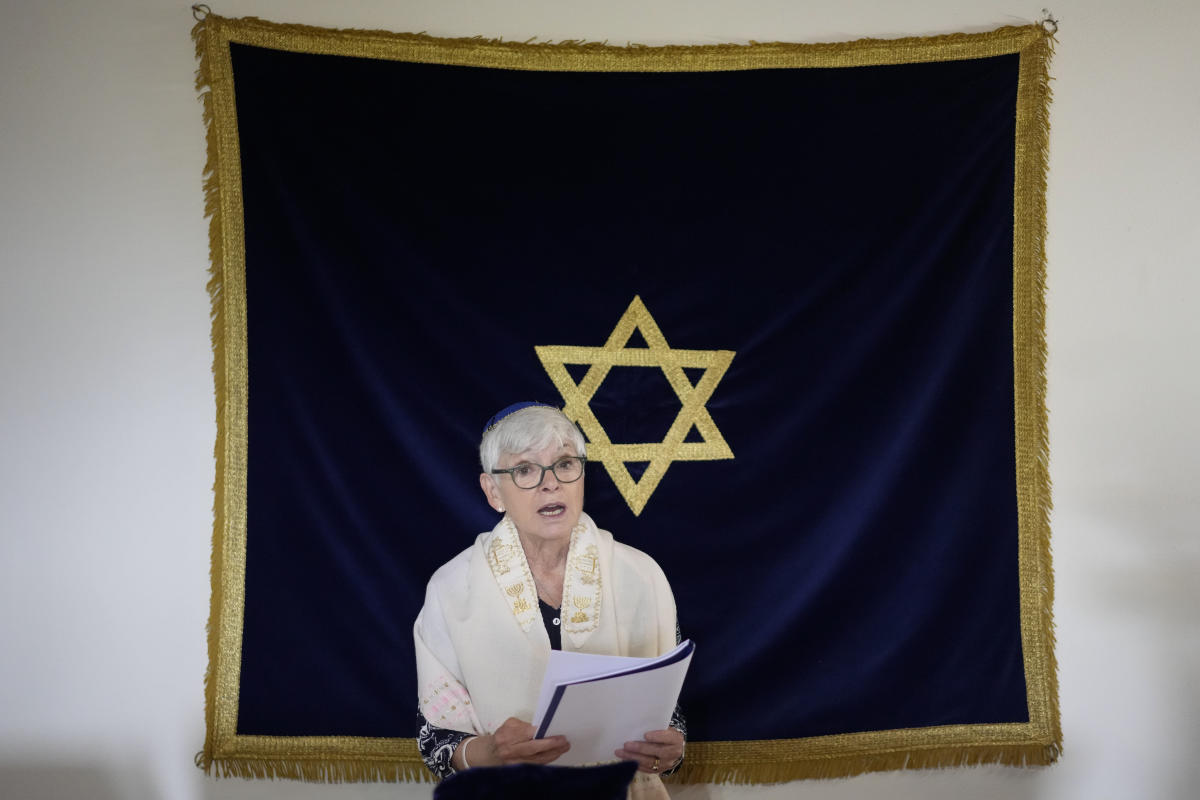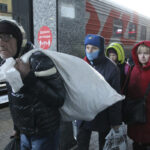
SERRASTRETTA, Italy (AP) — From a rustic, tiny synagogue she fashioned from her family’s ancestral home in this mountain village, an American rabbi is keeping a promise made to her Italian-born father: reconnect people in this southern region of Calabria to their Jewish roots, links nearly severed five centuries ago when the Inquisition forced Jews to convert to Christianity.
In the process, Rabbi Barbara Aiello is also helping to revive Serrastretta, one of many small southern towns struggling with dwindling population, as young people leave in droves to find work and where each year deaths far outnumber births.
Besides the chatter of visitors who come to her synagogue, curious to learn about Judaism in predominantly Catholic Italy, the laughter of newly arrived children resounds in the town. This spring, the rabbi helped bring Ukrainian refugees, including some with Jewish roots, to live here for now, and — Serrastretta’s mayor hopes — maybe permanently.
On a small wooden table near the synagogue’s entrance sits a yellowed family portrait. In the photograph, is the rabbi’s father, Antonio Abramo Aiello, as a child. Born in Serrastretta, he was studying for his bar mitzvah, the rabbi said, but before that religious coming-of-age ritual could take place, the young Aiello left with his family for the United States in 1923.
His daughter, Barbara, would be born in Pittsburgh and ordained a rabbi when she was 51, in a small branch of American Judaism known as Reconstructionist movement.
Before studying to become a rabbi, Aiello taught special needs children for many years, creating a puppet show to help teach kids about tolerance. Ordained at the Rabbinical Seminary International in New York, she served at a synagogue in Florida for a few years before moving to Italy, where she first worked as a rabbi in Milan from 2004-2005. Then she realized her passion in serving as a rabbi in her late father’s native town.
When visitors arrive from abroad for ceremonies at her synagogue, Rabbi Aiello, who is 74, shows them the house in what had been the Jewish quarter in the nearby city of Lamezia Terme, where her father had been learning about his Jewish faith.
She points out a plaque which reads: “In this quarter was active an industrious community” of Jews from the 13th till the 16th centuries.
One recent summer evening, as Aiello, who wears a yarmulke and necklace with a small Star of David, walked by en route to the ancient neighborhood, a local resident, Emilio Fulvo, 73, leaped up from a bench to greet her. When he was 15, Fulvo recounted, genealogical research discovered that his family has Jewish roots.
Learning about his background “made me feel free,” Fulvo said. “I knew something was missing” while raised as a Catholic in southern Italy.
Families like his are known as B’nai Anusim, descendants, of “those who were forced to accept Christian baptism and to publicly renounce their Judaism,’’ the rabbi said.
In her family, “legends were passed along that we were Jews, and we were expelled from Spain in 1492,” as the Inquisition gathered steam, Aiello said. Eventually, the Aiellos made their way to the southern end of the Apennine mountains, where Serrastretta sits, perched atop a road winding through slopes thickly forested with beech, pine and chestnut trees.
The remoteness of many villages in Calabria, coupled with Italians’ tendencies to live in the same places for generations and the strength of oral traditions, helped keep alive what Roque Pugliese, a Jew in Calabria, calls the “spark of Judaism” even among those who don’t realize they have Jewish heritage.
A physician who emigrated from Argentina, Pugliese recalled once hearing residents of a care home in Calabria sing an ancient song about Passover, softly, as if afraid to be overheard.
On a stone wall along a walkway that leads to Aiello’s home and synagogue is a Star of David.
On a recent Friday afternoon, she set out a bowl of cherries and a tray of miniature pastries for those coming for a bat mitzvah sought by the Blum family of Parkland, Florida. They chose Aiello despite the great distance because, before becoming a rabbi, she had worked as a special needs educator, and their daughter, Mia, has autism.
Pushing a child’s stroller up the steep street that leads to the synagogue was Vira, one of five Ukrainian mothers, who, with nine children among them, were brought to Serrastretta thanks to efforts by Aiello and logistical help from a Serrastretta native. Transportation and housing costs have been paid by donors, most of them Jewish, in Britain, the United States, Australia and Canada, the rabbi said.
Two of the women have since returned to Ukraine, including the wife of an Orthodox Christian priest. But Vira, who asked that her surname not be published because her husband, still in Ukraine, works for a government ministry, said she is considering settling in Serrastretta.
“The first thing is my son, my only son, his life, his future, his safety,’’ Vira said of 2½-year-old Platon. “Barbara invited us to a safe place. It was like really a miracle.”
Vira is also grateful for the opportunity to learn about Judaism. Her grandmother, born in Crimea, is Jewish. But her father, a Russian, would take her to church, so she had never gone to a Jewish house of worship, she said. Aiello “invited me to a bar mitzvah. It was a very beautiful experience that she opened her house to me.”
The rabbi said she tells those curious about their past to “embrace those (traditions) that make sense to you — embrace all, embrace some, but understand that you were once Jewish (in your family) and we can connect you, reconnect you, if you so choose.”
Mayor Antonio Muracca hopes at least some Ukrainians stay. “These guests have created in a certain sense more vitality in our town,’’ he said. Serrastretta has seen “a shocking depopulation,″ the mayor said. “There are so many old people, few children.”
The town’s population shrank from 4,000 in 2001 to 2,900 in 2020.
Serrastretta was long called “the city of chairs,’’ because generations of artisans handcrafted furniture from beech wood with seats fashioned from woven reeds. But demand for cheaper, mass-produced furniture decimated the trade.
Serrastretta’s parish pastor, the Rev. Luigi Iuliano, invited Aiello to read a Psalm at Easter vigil services in April. With the rabbi there is no “competition, jealousy.”
“We brought the First Communion kids to show them the Torah, the synagogue, to become aware that our faith in a certain way comes from the Hebrew faith,’’ said Iuliano, a Serrastretta native.
Aiello, who describes herself as the only female rabbi in Italy and who runs Calabria’s only synagogue, relies on destination weddings and bat and bar mitzvahs to boost her synagogue’s finances.
She is cut off from funding that derives from taxpayer donations in Italy. The Italian government only recognizes the Orthodox Jewish communities in Italy, whose official members number about 23,000, nearly half of those living in Rome and barely 200 living in southern Italy.
___
Associated Press religion coverage receives support through the AP’s collaboration with The Conversation US, with funding from Lilly Endowment Inc. The AP is solely responsible for this content.




